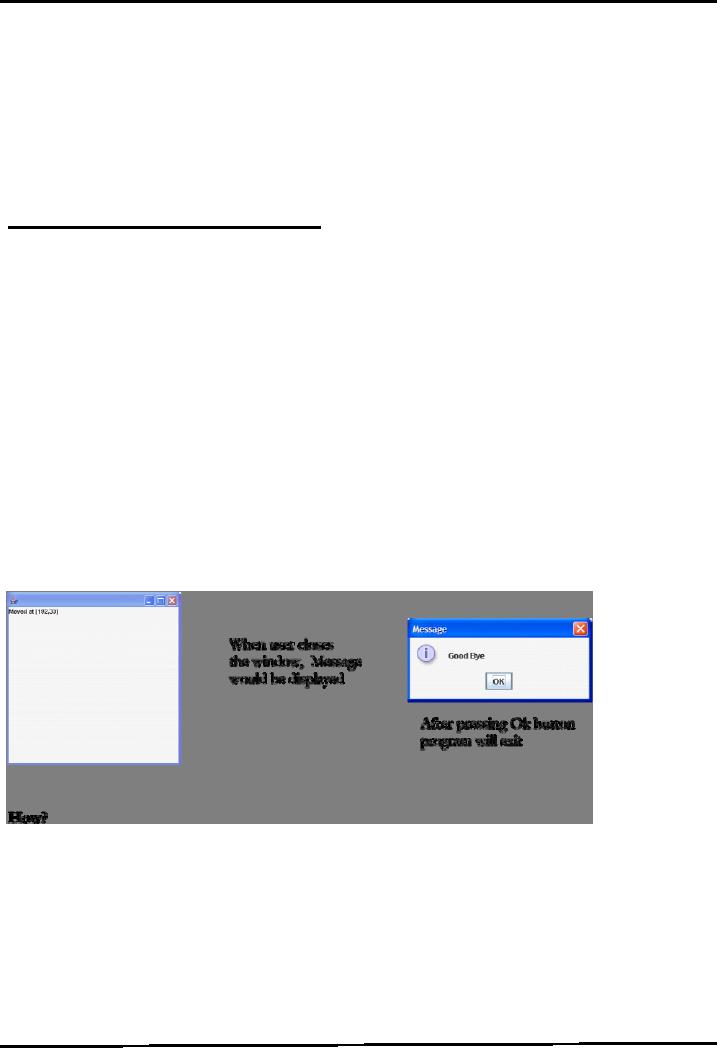 |
JAVA: More Examples of Handling Events |
| << JAVA: Event Handling |
| JAVA: Problem in Last Code Example >> |

Web
Design & Development CS506
VU
Lesson
12
More
Examples of Handling Events
Handling
Mouse Event
Mouse
events can be trapped for
any GUI component that inherits
from Component class. For
example,
JPanel,
JFrame & JButton
etc.
To
handle Mouse events, two
types of listener interfaces are
available.
MouseMotionListener
MouseListener
The
class that wants to handle
mouse event needs to
implement the corresponding interface
and
needs
to provide the definition of all the
methods in that
interface.
MouseMotionListener
interface
Used
for processing mouse motion
events
Mouse
motion event is generated
when mouse is moved or
dragged
MouseMotionListener
interfaces is defined in JDK as
follows
public
interface MouseMotionListener
{
public
void mouseDragged (MouseEvent
me);
public
void mouseMoved (MouseEvent
me);
}
MouseListener
interface
Used
for processing "interesting"
mouse events like when
mouse is:
Pressed
Released
Clicked
(pressed & released without
moving the cursor)
Enter
(mouse cursor enters the bounds of
component)
Exit
(mouse cursor leaves the bounds of
component)
MouseListener
interfaces is defined in JDK as
follows
public
interface MouseListener
{
public
void mousePressed (MouseEvent
me);
public
void mouseClicked (MouseEvent me);
public
void mouseReleased (MouseEvent
me);
public
void mouseEntered (MouseEvent
me);
public
void mouseExited (MouseEvent me);
}
Example
Code: Handling Mouse
Events
Example
to show Mouse Event Handling
.Every time mouse is moved,
the coordinates for a new
place is shown in
a label.
99

Web
Design & Development CS506
VU
1.
import java.awt.*;
2.
import javax.swing.*;
3.
import java.awt.event.*;
4.
public class EventsEx implements
MouseMotionListener{
5.
JFrame frame;
6.
JLabel coordinates;
7. // setting
layout
8.
public void initGUI ( )
{
9.
// creating event
generator
10.
frame = new
JFrame();
11.
Container
cont = frame.getContentPane();
12.
cont.setLayout(new
BorderLayout( ) );
13.
coordinates
= new JLabel ();
14.
cont.add(coordinates,
BorderLayout.NORTH);
15.
//
registring mouse event handler with
generator
16.
frame.addMouseMotionListener(this);
17.
frame.setDefaultCloseOperation(JFrame.EXIT_ON_CLOSE);
18.
frame.setSize(350,
350);
19.
frame.setVisible(true);
20.
} //
end initGUI method
21.
//default
constructor
22.
public
EventsEx ( ) {
23.
initGUI();
24.
}
//
MouseMotionListener event hadler handling
dragging
25.
public
void mouseDragged (MouseEvent
me) {
26.
int x =
me.getX();
27.
int y =
me.getY();
28.
coordinates.setText("Dragged
at [" + x + "," + y + "]");
29.
}
//
MouseMotionListener event handler
handling motion
30.
public
void mouseMoved (MouseEvent
me) {
31.
int x =
me.getX();
32.
int y =
me.getY();
33.
coordinates.setText("Moved
at [" + x + "," + y + "]");
100

Web
Design & Development CS506
VU
34.
}
35.
public
static void main(String
args[]) {
36.
EventsEx ex = new
EventsEx();
37.
}
38.
} //
end class
Another
Example: Handling Window
Events
Task
We
want to handle Window Exit
event only
Why?
When
window is closed, control
should return back to command
prompt.
But
we have already achieved this
functionality through following
line of code
frame.setDefaultCloseOperation(JFrame.EXIT_ON_CLOSE);
But,
what if we want to display
some message (Good
Bye)
before exiting?
To
handle window events, we
need to implement "WindowListner"
interface.
"WindowListner"
interface contains 7 methods
We require only one
i.e.
windowClosing
But,
We have to provide definitions of all
methods to make our class a
concrete class
WindowListener
interface is defined in the JDK as
follows
public
interface WindowListener
{
101

Web
Design & Development CS506
VU
public
void windowActivated(WindowEvent
we);
public
void windowClosed(WindowEvent
we);
public
void windowClosing(WindowEvent
we);
public
void windowDeactivated(WindowEvent
we);
public
void windowDeiconified(WindowEvent
we);
public
void windowIconified(WindowEvent
we);
public
void windowOpened(WindowEvent
we);
}
public
void windowClosing(WindowEvent we is our
required method
Example
Code: WindowExitHandler
This
example code is modification of the last
code example i.e.
EventsEx.java
1.
import
java.awt.*;
2.
import
javax.swing.*;
3.
import
java.awt.event.*;
4.
public
class EventsEx implements MouseMotionListener
,
WindowListener
{
5.
JFrame
frame;
6.
JLabel
coordinates;
// setting
layout
7.
public
void initGUI ( ) {
// creating event
generator
8.
frame =
new JFrame();
9.
Container
cont = frame.getContentPane();
10.
cont.setLayout(new
BorderLayout( ) );
11.
coordinates
= new JLabel ();
12.
cont.add(coordinates,
BorderLayout.NORTH);
//
registring mouse event handler with
generator
13.
frame.addMouseMotionListener(this);
// registering
window handler with
generator
14.
frame.addWindowListener(this);
15.
frame.setSize(350,
350);
16.
frame.setVisible(true);
17.
} //
end initGUI method
//default
constructor
18.
public
EventsEx ( ) {
19.
initGUI();
20.
}
102

Web
Design & Development CS506
VU
//
MouseMotionListener event hadler handling
dragging
21.
public
void mouseDragged (MouseEvent
me) {
22.
int x
= me.getX();
23.
int y
= me.getY();
24.
coordinates.setText("Dragged
at [" + x + "," + y + "]");
25.
}
//
MouseMotionListener event handler handling
motion
26.
public
void mouseMoved (MouseEvent
me) {
27.
int x
= me.getX();
28.
int y
= me.getY();
29.
30.
coordinates.setText("Moved
at [" + x + "," + y + "]");
31.
}
//
window listener event handler
32.
public
void windowActivated (WindowEvent we) {
}
33.
public
void windowClosed (WindowEvent we) {
}
34.
public
void windowClosing (WindowEvent we)
{
35.
JOptionPane.showMessageDialog(null,
"Good Bye");
36.
System.exit(0);
37.
}
38.
public
void windowDeactivated (WindowEvent we) {
}
39.
public
void windowDeiconified (WindowEvent we) {
}
40.
public
void windowIconified (WindowEvent we) {
}
41.
public
void windowOpened (WindowEvent we) {
}
42.
public
static void main(String
args[]) {
43.
EventsEx ex = new
EventsEx();
44.
}
45.
} //
end class
103
Table of Contents:
- JAVA FEATURES
- Java Virtual Machine & Runtime Environment
- Learning Basics of JAVA
- JAVA: Object Oriented Programming
- JAVA: Inheritance
- JAVA: Collections
- JAVA: Intro to Exceptions
- JAVA: Streams
- JAVA: Modification of Address Book Code
- JAVA: Graphical User Interfaces
- JAVA: Event Handling
- JAVA: More Examples of Handling Events
- JAVA: Problem in Last Code Example
- Java Database Connectivity
- JAVA: More on JDBC
- JAVA: Result Set
- JAVA: Meta Data
- Java Graphics
- JAVA: How to Animate
- JAVA Applets
- JAVA: Socket Programming
- JAVA: Serialization
- JAVA: Multithreading 1
- JAVA: Multithreading 2
- JAVA Web Application Development
- Java Servlets
- JAVA: Creating a Simple Web Application in Tomcat
- JAVA: Servlets Lifecycle
- JAVA: More on Servlets
- JAVA: Dispatching Requests
- JAVA: Session Tracking 1
- JAVA: Session Tracking 2
- JAVA: AddressBook Case Study Using Sevlets
- Java Server Pages 1
- JavaServer Pages 2
- Java Server Pages 3
- JAVA: JSP Action Elements and Scope
- JAVA: JSP Custom Tags
- JAVA: MVC + Case Study
- JAVA: MVC Model 2 Architecture
- JAVA: Layers and Tiers
- JAVA: Expression Language
- JAVA: JavaServer Pages Standard Tag Library (JSTL)
- JAVA: Client Side Validation & JavaServer Faces (JSF)
- JAVA: JavaServer Faces